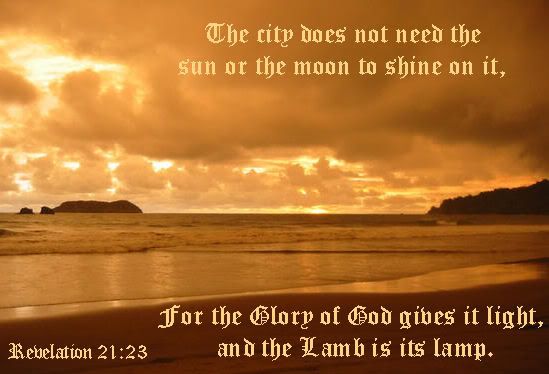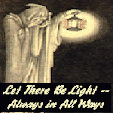Our Father, who art in heaven
hallowed be thy Name,
thy kingdom come,
thy will be done,
on earth as it is in heaven.
Give us this day our daily bread
And forgive us our trespasses,
as we forgive those
who trespass against us.
And lead us not into temptation,
but deliver us from evil.
For thine is the kingdom,
and the power, and the glory,
for ever and ever.
Amen.



















4 Comments:
Who Art In Heaven" (2794)
"In heaven" doesn't mean that God is in a place (space). It expresses God's way of being. He is not "elsewhere." Because he is holy, God is close to the contrite heart. "God is in the hearts of the just as in his holy temple. Those who pray should desire the one they invoke to dwell in them" (St. Augustine). "‘Heaven' could also be those who bear the image of the heavenly world" (St. Cyril of Jerusalem).
Our Homeland And Our Goal (2795-2796)
Sin has exiled us but conversion returns us to the Father's house. Christ has "descended" and "ascended" and heaven and earth are reconciled in him.
"Our Father who art in heaven" means we are already seated "with him in the heavenly places in Christ Jesus" (Eph 2:6). Yet we "groan and long to put on our heavenly dwelling" (2 Cor 5:2). "Christians spend their lives on earth, but are citizens of heaven" (Letter to Diognetus).
We Dare To Say (2777-2778)
Both Western and Eastern liturgies tell us to say "Our Father" with filial boldness. In contrast, Moses was told, "Do not come near; put off your shoes from your feet" (Ex 3:5). This is because Jesus has crossed over the threshold of holiness, bringing us into the Father's presence. "Here am I, and the children God has given me" (Heb 1:13). "When would a mortal dare call God ‘Father' if man were not animated by a power from on high?" (St. Peter Chrysologus).
The liturgies describe this power as "Parrhesia," (meaning filial trust, humble boldness, and the certainty of being loved).
A Purified Idea Of Father (2779)
We must purify our minds of certain false images stemming from our own experiences and from our culture. Really, "No one knows the Father except the Son and anyone to whom the Son chooses to reveal him," namely, "to little children" (Mt 11:25-27). If we impose our ideas of "father" upon him, we would fabricate an idol. The mystery of the Father is revealed only by the Son. "The expression God the Father had never been revealed to anyone. Now the Father's name has been revealed to us in the Son, for the name ‘Son' implies the new name ‘Father'" (Tertullian).
The Spirit's Help (2780)
Because Jesus revealed this truth, we can invoke God as "Father." Although we cannot even conceive of the Son's relation to the Father, the Spirit enables those who believe in Jesus to participate in that relationship.
Adoring The Father (2781-2782)
In this prayer, we are in communion with the Father and the Son, and recognize the Father with a new sense of wonder. Our prayer is adoration (we recognize him as "Father") and thanksgiving (for having revealed his name and having dwelling within us).
We can adore the Father. He has adopted us in Baptism and has made us other "Christs." "God predestined us to adoption as his sons. You who have become sharers in Christ are appropriately called ‘Christs'" (St. Cyril of Jerusalem). "The reborn man says first of all ‘Father' because he is now a son" (St. Cyprian).
Self-Revelation (2783)
The Lord's Prayer reveals us to ourselves: "Suddenly your sins have been forgiven. From being a wicked servant you have become a good son. Suddenly you have received the grace of Christ and all your sins have been forgiven. Raise your eyes to the Father and say ‘Our Father' so you may merit being his son" (St. Ambrose).
Two Dispositions (2784-2785)
This gift of adoption demands two fundamental dispositions:
1. We must desire to be like the Father because we are restored to his likeness. "When we call God ‘our Father' we ought to behave as sons of God" (St. Cyprian). "You cannot call God your Father if you preserve a cruel and inhuman heart" (St. John Chrysostom). We must contemplate the Father's beauty, and adorn our souls accordingly" (St. Gregory of Nyssa).
2. We must "become like children" (Mt 18:3) to receive the Father's revelation. "The soul speaks very familiarly to God as to its own Father" (St. John Cassian).
"What would he not give his children who ask, since he has already granted the gift of being his children" (St. Augustine).
Meaning Of "Our" (2786-2788)
"Our" does not express our possession of God but a new relationship with him.
"Our" recognizes that in Christ's new eternal Covenant, we are "his" people and he is "our" God. We must respond to this "grace and truth" of Christ (Jn 1:17).
The Our Father is the prayer of the "end time." "Our" shows that we believe that God will say to the victor, "I will be his God and he shall be my son" (Rev 21:7).
Communion Not Division (2789-2790)
By addressing the Father, we do not divide the Godhead. Rather, we confess that the Son is eternally begotten by him and the Spirit proceeds from him. Our communion is with the Father, the Son, and the Spirit. When we pray to the Father we glorify the Son and the Spirit.
Obviously the word "our" refers to more than one person. There is only one God, recognized as Father by all the baptized. United with Jesus ("the firstborn among many brethren - Rom 8:29), the Church is in communion with the Father and the Spirit. "Our" shows that all are "of one heart and soul" (Acts 4:32).
Our Division And Individualism (2791-2793)
Although Christians are divided, "our" shows our common patrimony and summons us to join in Jesus' prayer for unity.
We must leave individualism behind. The "our" and "us" in the four last petitions includes everyone. This prayer demands that we overcome our division.
We must bring everyone to "our" Father. We must be open to all who do not know Christ so that he might "gather into one the children of God" (Jn 11:52).
Source:
http://www.catholicity.com/catechism/our_father_who_art_in_heaven.html
I really like what you have here talking about what the Lord's Prayer means. I never have read anything where it breaks it down like that. It is very interesting. Thank you for sharing that!
God Bless You (\ô/)
((Warm Hugs))
Erin
Post a Comment
<< Home